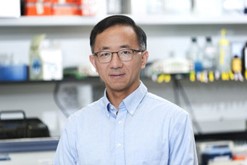
Research
The research of my laboratory focuses on two directions highly relevant to cancer biology, (1) the molecular basis of programmed cell death processes (including apoptosis and ferroptosis), and their roles in human disease; and (2) the molecular basis of autophagy and its role in cancer. We also study various cancer signaling and cellular metabolic events, especially those involved in cell death/survival determination. We aim to translate our basic research finding into potential therapeutic approaches. To achieve these goals, the laboratory utilizes a combination of approaches including biochemistry, chemical biology, proteomics, molecular cell biology, high-throughput screening, 3-dimensional microfluidic cell array, and mouse modeling.
Current Projects:
- Mechanisms of ferroptosis and cancer cell addiction to autophagy; related therapeutic development.
Bio
Xuejun Jiang earned his bachelor’s and master’s degrees in Biochemistry at Fudan University, China in 1990 and 1993 respectively. In 1999, Jiang completed his PhD degree at Pharmacology Department, University of Texas Southwestern Medical Center (UTSW), under the mentorship of Dr. Paul Sternweis. He then joined the Lab of Dr. Xiaodong Wang at UTSW as a postdoctoral fellow to study apoptosis. In 2003, he joined MSKCC to establish his own independent lab. Xuejun is now a Member of MSKCC and a Professor at both Gerstner Sloan Kettering Graduate School and Cornell University Weill Medical College.
Distinctions:
- 2007 Louis and Allston Boyer Young Investigator Award
- 2007-2010 American Cancer Society Scholar
- 2006-2010 Catherine and Frederick Adler Chair for junior faculty
- 2004-2006 V Scholar
- 2004-2007 Alfred Bressler Scholar
- 1998 Sigma Xi Award, UT Southwestern
- 1995-1999 Robert A. Welch Pre-doctoral Fellowship
